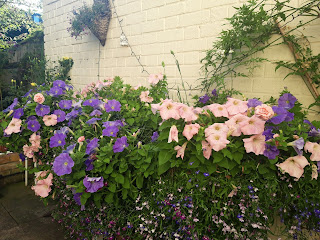Another summer passes and as always, I think
of Shakespeare’s sonnet 18, “rough winds do shake the darling buds of May and
summer’s lease hath all too short a date”. Spot on, Willie. The colours are
fading, the temperatures are dropping, nights are getting longer. Summer only
seemed to arrive the other day. In fact, summer this year was about as long as
it gets on this island. Starting with an Easter heat wave in late April and
finishing on Sunday, mid-September with around 25 degrees. In between has been
mixed. May was mostly poor to reasonable, June was often cool, until the last
weekend when there was another brief heatwave. Temperatures hit the thirties
for a couple of days. The ‘Spanish Plume’ of warm air from the Azores, made it
feel briefly like Southern Spain. That warm summer evening I saw a hummingbird
hawkmoth as I went for a leisurely stroll, a Mediterranean visitor. A unique
insect that feeds on nectar by hovering in the manner of a hummingbird. That
was one of three sightings this summer. The most recent was last Friday in my
garden.
July
was mostly very pleasant, particularly during the Wimbledon fortnight, but nothing particularly out of the ordinary until the
last week when again, we had another brief incursion of very hot air from the
continent. Record breaking temperatures in fact, but it soon returned to pleasant
enough to poor and back again, that is, until the last bank holiday of the
summer when it was again, briefly, very warm, not hot, but very warm for late
August. September has been nothing to write home about until last sunday. So,
there you go, five (short) warm spells over five months, could have been worse, could
have been better.
As for
the nature highlights, a few stand out. The swifts, numerous in Muswell Hill,
as always, were a thrill. I talk about them a lot as they are a symbol of
summer in the city for me with their screech and their acrobatic flight through
the blue summer sky. They had gone by mid-August. The insect pollinators are
always of interest too. Starting in April with the little brown bumblebees
which fly at lower temperatures than the classic striped bumblebee and
honeybees. Fittingly, they’re the only ones I’ve seen recently when
temperatures have been cool, last Sunday aside. Later in May, as it finally got
a bit warmer, honeybees and various types of bumblebee appeared, enjoying the
lavender, scabious and buddleia, including an absolutely monstrous bumble
recently. Solitary wasps too, small, discrete and colourful. The latest to
arrive and to frequent the garden were hoverflies. A plethora of them. They
were the most abundant pollinator this last quarter of the summer. Very
pleasant things, they mimic wasps to ward off potential predators but are
harmless.
Another
fascinating visitor, in late August, was an Emperor dragonfly. The UK’s largest,
they tend to be seen near water sources so I’m not sure what this one was doing
in the garden but it came three or four times over a week and stayed for a few
minutes each time, mesmerising with its size, striking blue and green body and
its amazingly agile flying. No plane has yet been built that
can fly like a dragonfly. That’s perhaps just as well. I don’t fancy trying to drink
a gin and tonic with such rapid changes of direction. To stand there, still, as
such an impressive insect flies up close, is special. These types of encounters
do have a slightly spiritual vibe, I feel, as they’re not normal. They touch
you differently as they’re unexpected. Was it the spirit of a friend perhaps?
Someone who is no longer with us? Perhaps, perhaps not. To some questions, they
are no answers. Either way, it was an emotional moment.
Butterflies
were the other highlight amongst the insects. Cabbage whites were in abundance
in the garden, the odd fritillary, a woodland species mostly, with brown spots
and the occasional red admiral. It’s my favourite, a truly beautiful butterfly
with a powerful combination of red, black and white colouring. In fact,
overall, it was a more interesting summer for insects than birds, in my garden,
at least. Nothing unusual and no summer visitors, such as willow warblers etc.,
though my sighting of a peregrine falcon flying over Alexandra Palace recently
was a moment to cherish.
One of the saddest things about
summer’s wane is the insects’ gradual disappearance. Or conversely, one of the
nicest things about summer is the presence of insects. They bring sound, shape
and energy to the moment. Nature is at the peak of its powers in summer. There
is colour, there is warmth, there’s a “buzz”. One reluctantly accepts the change of seasons and charms that come with autumn but there’s nothing quite like a bee buzzing around your plants with the
smell of lavender filling the warm air or walking through Hampstead Heath with the crickets in full song.
There’s still some warmth to come I’m sure in
the next few weeks but as the buzzing stops, more and more spider webs will
appear in gardens. That image is to autumn, what swifts are to summer. All the
seasons have their appeal, but I never feel more alive than on a warm summer’s
evening. The buzzing things too, I’ll wager.



No comments:
Post a Comment